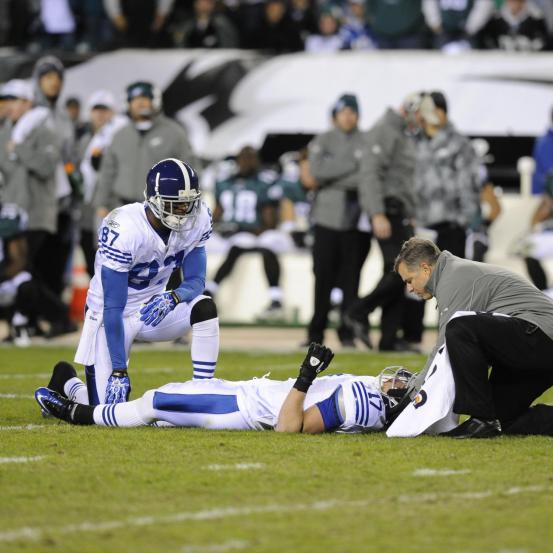- Commissioner’s statement on Ventura, Marte
- Ronnie O’Sullivan: Masters champion ‘felt so vulnerable’ in final
- Arron Fletcher Wins 2017 WSOP International Circuit Marrakech Main Event ($140,224)
- Smith challenges Warner to go big in India
- Moncada No. 1 on MLB Pipeline’s Top 10 2B Prospects list
- Braves land 2 on MLB Pipeline’s Top 10 2B Prospects list
- Kingery makes MLB Pipeline’s Top 10 2B Prospects list
- New Zealand wrap up 2-0 after Bangladesh implosion
- Mathews, Pradeep, Gunathilaka to return to Sri Lanka
- Elliott hopes for rain for Poli
Stigmatized by Concussions, My NFL Career Has Inspired Renewed Dreams
- Updated: May 16, 2016

After suffering a series of brutal concussions between 2010 and 2012, former Indianapolis Colts wide receiver Austin Collie became a poster child for the league’s head trauma crisis. Now, he has walked away from football in order to take a job as a care coordinator and director of business development for a concussion clinic in Utah.
The following is a first-person story from Collie documenting his experience with concussions, his education in the field of traumatic brain injuries and his quest to help fellow former and current athletes better deal with the recovery process, as told to Bleacher Report’s Brad Gagnon.
I don’t remember being knocked out in Philadelphia in 2010, but I later realized I had been unconscious for several minutes. Someone told me it was the longest they’d ever seen a player out cold. I remember coming to on the stretcher and being confused, as though I was in a dream. I called my wife from the locker room and remember telling her I was fine and that everything was OK. I thought I was making sense, but when I got home, she told me she didn’t even know what I was saying. I was speaking gibberish.
Unfortunately, that was just the beginning of my nightmare sophomore season in the NFL. For obvious reasons, fans seem to remember that concussion in Philadelphia the most, but after passing concussion protocol and returning two weeks later, I suffered a setback when I slammed my head on the turf in New England. And I was knocked out yet again a month after that in a game against Jacksonville, ending my season and forever altering the course of my NFL career.
My concussions were visually devastating—they didn’t look good. Combine that with the public’s perception of concussions, and it was no surprise that no matter where I went after that stretch, I was constantly being reminded of my head injuries, whether it was people asking me how my head was or asking what I’d do about it. I had people texting me, tweeting me, emailing me about my head.
I returned in 2011, playing in all 16 games, but after I suffered another concussion in the 2012 preseason, a lot of people pushed for me to retire. All I ever heard from the public and the media was, “Collie will have dementia by the time he’s 40,” and, “He should be taking his family into mind.”
Part of me was very grateful that everyone was concerned for my health. But at the same time, the other part of me was extremely annoyed. Because ultimately, the decision was my family’s and mine to make, and it’s hard to let football go.
At that time, I was reaching my dreams. I had gone to the Super Bowl in 2009, and now I was proving that I could hang with some of the best from a statistical standpoint. I was looking at what could have possibly been a Pro Bowl season. And what people don’t get is when you’ve pictured those accomplishments in your mind since you were eight years old, lying in bed, and it’s finally happening, and everything’s happening the way you’d imagined it, it’s extremely hard to say, “Oh, I’ve got a head injury, and there’s no definitive evidence it’ll affect me, but I should stop playing.”
The reality of reaching the NFL is that while it’s important to have things—family or church, for example—that are higher on the priority list, football becomes who you are. When you’ve been at it for so long, it becomes your life. So I was never going to give all that up because of public pressure, especially considering I had doctors and neuropsychologists telling me I was fine.
See, while I was dealing with that unfortunate spate of concussions, I took a very proactive approach. Knowing that a standard MRI only showed structural damage, I wanted tangible evidence that everything was OK with my brain from a functional standpoint.
That’s why I was checked out by Dr. Alina Fong—a neuropsychologist with a background in neuroradiology—and Dr. Mark Allen—an expert in cognitive neuroscience—at the CognitiveFX concussion clinic here in Provo, Utah, and they told me I could rehab and get back to having a healthy brain again, a brain that would function within normal limits and allow me to return to the football field, if I chose to.
That’s all I really needed to hear, and from there on out, I really didn’t listen to what the public had to say. I was very grateful that a lot of fans and people cared about my well-being, but the lack of basis also made it frustrating.
In fact, it was something that …
continue reading in source www.bleacherreport.com
